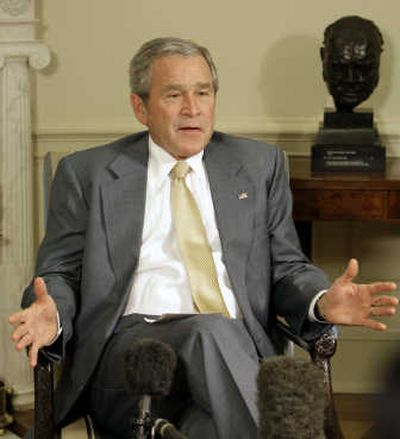Bush defends interrogation, denies method is torture

WASHINGTON – President Bush on Friday defended the CIA’s harsh interrogation of terrorism suspects, saying its methods do not constitute torture and are necessary to protect America from attack.
But Bush’s declaration that the United States “does not torture people” did little to dampen the fallout from fresh evidence that his administration has used secret legal memos to sanction tactics that stretch, if not circumvent, the law.
The president’s comments came amid disclosures this week of classified opinions issued by the Justice Department in 2005 that endorsed the legality of an array of tough interrogation tactics, including sleep deprivation and simulated drowning.
Bush’s decision to comment again on what once was among the most highly classified U.S. intelligence programs underscores the political peril surrounding the issue for the White House, which has had to retreat from earlier, aggressive assertions of executive power.
It also reflects the extent to which the debate over tactics in the war on terror remains unresolved, six years after the Sept. 11 attacks. The limits on CIA interrogators have been particularly fluid, shifting repeatedly under a succession of legal opinions, court rulings and executive orders.
In a brief appearance at the White House, Bush stressed the legality of the CIA program – even while making the case for continued use of coercive methods.
“We stick to U.S. law and our international obligations,” Bush said. But when the United States locates a terrorism suspect, he added: “You bet we’re going to detain them, and you bet we’re going to question them – because the American people expect us to find out information, actionable intelligence so we can help protect them. That’s our job.”
The president’s comments were met with outrage from key Democrats in Congress.
“The administration can’t have it both ways. I’m tired of these games,” said Sen. John D. Rockefeller IV of West Virginia, chairman of the Senate Intelligence Committee. “They can’t say that Congress has been fully briefed while refusing to turn over key documents used to justify the legality of the program.”
The issue is expected to confront Michael Mukasey, Bush’s nominee to be the next attorney general, at a Senate confirmation hearing later this month.
The two memos that surfaced publicly this week are among a collection of documents the White House has refused to turn over to congressional committees examining the CIA detention and interrogation program.
The newly uncovered memos, which were described for the first time Thursday by the New York Times, were drafted by the Justice Department shortly after Alberto Gonzales took over as attorney general in February 2005. They appear to show that the Bush administration was continuing to condone harsh interrogation techniques by the CIA even as Congress was moving to outlaw them.